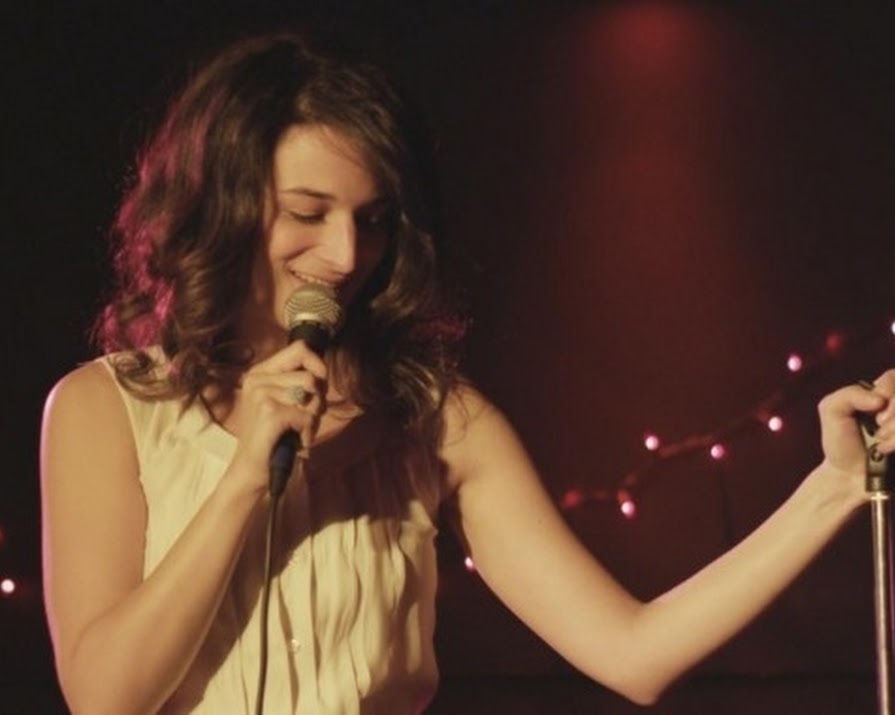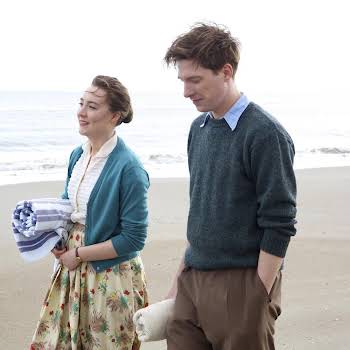
By Jeanne Sutton
08th Jul 2014
08th Jul 2014
We catch up with Gillian Robespierre, the director of Obvious Child, AKA this summer’s most unexpected hit romantic comedy…
Abortion on screen has an uneasy history. In the Cary Grant drama People Will Talk, the young female character is tricked into believing she has undergone the procedure, only to find herself still pregnant after she marries cinema’s most debonair man. Crisis averted. Happily ever after and bouncing baby ensued. In modern romantic comedies, abortion is what Hitchcock would have called a MacGuffin, a plot device to get our protagonist where we want them, i.e. after a brief meandering scene involving a waiting room, Little Miss Pregnant ends up in the arms of the male love interest with a montage involving pram-shopping. Knocked Up and Juno touch upon abortion with a brevity that seems a tad unrealistic, considering the leads are at first thoroughly not interested in becoming mothers. Dirty Dancing is the only popular movie that springs to mind in which the issue is dealt with seriously and without judgement. The dance movie illustrates the back-street abortion scene that thrived pre-Roe v Wade (the legal decision that led to abortion being legalised in the United States) and sometimes killed desperate women. The film even lost corporate sponsorship from Clearasil because writer Eleanor Bergstein refused to change this powerful sub-plot.
The last few months have seen this topic of abortion in film come to the fore again with the release of Obvious Child, an indie flick that was initially a short film and is now a festival darling after a strong showing at Sundance this year. The comedian and actress Jenny Slate plays Donna, a young comedian in her late twenties whose life is starting to implode. She loses her job, breaks up with her cheating boyfriend and is struggling with money while trying to pursue a stand-up career. She’s on track for the worst Valentine’s Day of her life when she meets Max. Cue chemistry and a one-night stand. A crisis pregnancy follows and Donna decides that now is not the time to become a mom. What follows is a romantic comedy with one hot topic – abortion – but also a lot of non-judgemental empathy for a heroine who’s trying to find her voice, and maybe The One.
We got director Gillian Robespierre – familial connections with Monsieur Reign of Terror yet to be established – on the phone to talk about the movie, which premieres in Ireland this month.

Did you always want to be a film-maker?
I come from a family who definitely pumped a lot of movies into our brain, starting from when we were little. There’s a story that I was an infant and we went to see?Close Encounters of the Third Kind. I sat through the whole thing, didn’t cry, and I didn’t go to sleep either. I just watched it. I think from an early age I really was attracted to visual imagery. I had dyslexia when I was little and it was hard to read. I love reading and I’m definitely overcome by the writing aspect of dyslexia, clearly. When I was little, my mom would read to me a lot and I would really relate to moving pictures instead of sitting down and reading a book – and I think that visual medium really spoke to me more than books did when I was little, because I had such a hard time reading. My dad went to NYU film school and then into advertising, but he encouraged us to watch anything and everything. He never censored. We could watch R-rated movies from the time we were five. I don’t know if that’s good or bad but my vocabulary for cursing was pretty large!
Did you anticipate the attention the abortion aspect of the plot would attract?
It’s not that we wanted the attention. I think we were excited about whatever conversation would ignite from the story we were trying to tell. My co-writers and I really felt that the choice to have an abortion is silenced in our culture and in mainstream media, and the fact that everyone from?Indiewire to the?New York Times is writing in their headlines ‘an abortion movie’ – and when they explain it in the body of the article, it’s always a very positive experience for Donna. Women have a wide range of experiences with abortion. It’s complicated. Some women are relieved. Some are conflicted. It’s not simple or one-dimensional. The entertainment industry has largely neglected to show the full range of experiences, so we’re really excited people are talking about it The word is being written in news articles – ‘the word’ meaning ‘abortion’ – and it takes away the stigma when writing about it. I think that that’s really exciting for us.

The movie is coming out at a very important time for women’s reproductive rights. You’ve got the Hobby Lobby and the abortion-clinic buffer-zone decision in the Supreme Court, and abortion has been a huge political issue in Ireland. What kind of personal reactions have you heard from people in relation to?Obvious Child?
Before the movie came out in theatres, we were lucky enough to travel a little bit to word-of-mouth screenings and different festivals in the United States. At one of the festivals I attended in Baltimore, Maryland, of all places, a woman came up to me and said that she’d had an abortion when she was a teenager. She was in her sixties and I think it was pre-Roe v Wade. She said her experience was not like Donna’s. It wasn’t as safe or positive – it haunted her – and that watching?Obvious Child changed her own narrative of her life. I was blown away. I had a lump in my throat. We embraced and hugged. Another woman came up to me and asked if I had a nanny-cam set up in her apartment because she dances around to Paul Simon’s?Obvious Child. I told her I did.
Men have come up to me too. They say, ‘Thanks for showing a nice supportive guy.’ Dudes are depicted as giant babies in movies, and one dimensional and not overly supportive or complex. They were psyched with Jake Lacy’s character, Max, because he’s a version of themselves. A nice guy, a funny guy and someone who’s going to be there at the end.
About rom coms in general – what are your influences and what do you want to see happen to the genre after?Obvious Child?
My influences are from the seventies and eighties. Woody Allen films like?Annie Hall,?Hannah and her Sisters and?Manhattan to Nicole Holofcener’s?Walking and Talking. John Hughes, The Graduate,?Say Anything… Obviously Nora Ephron is a huge influence. I think the subversive ones from the 1960s and 1970s are really fun. I just watched An Unmarried Woman, it’s a 1970s divorce movie and takes place in New York City and they talk about everything from masturbation to abortion. It’s just so ’70s – no one’s wearing bras! There’s so many nipples and awful outfits – it’s great. You should check it out. I don’t know what’s going to happen to the future of romantic comedies but I really feel there are amazing ways of storytelling that are happening right now in film and television – Louis CK, Lena Dunham, the?Broad City girls and Amy Schumer. These are comedies and I’m mentioning comedies because they’re what I’m attracted to. They’re also comedies that come from an authentic place and the storytellers are speaking some real honesty in their characters. And they’re all really different voices and they’re all really original voices. I think there’s a wave going on.?Obvious Child didn’t start any of it – but I feel really happy to have a place in it.

The topic of owning one’s mortification and embarrassment – we see that in a lot of rom coms, in shows like?Girls and Broad City, 30 Rock to a big extent, Nora Ephron’s writing, and your main character, Donna, is pretty honest in her stand- up on screen. Why do you think that is such a feature in women’s storytelling, all that out-there honesty?
I don’t know. My collaborators and I were trying to combine a lot of complex ideas and emotions that women, and men, have. We wanted to create a character who, on one hand, is very verbal and gregarious and has the confidence to go up on a stage, but on the other hand, in her real life, she’s trying to figure out how to overcome this weakness – she’s trying to discover her offstage voice and she doesn’t know how to be honest with her parents, herself. She’s playing a victim after she gets dumped. We all do that – it’s ‘Why me? Why me? What did I do wrong?’ and you never focus on the person who dumped you, who’s actually a real asshole because he’s been cheating on you. You always turn all that negativity inward and on yourself. I think she’s trying to discover herself and she truly does become less passive in her life and becomes more active. The moment where she’s in the recovery room with all the other women post-procedure, she’s just at peace. Yes, she’s relieved that this moment is over and the procedure is done with but, more than that, she’s at peace with herself. She starts making eye contact with the women around her and she’s making the first move. That’s a subtle way of us telling the audience that she is active in her life, she’s no longer going to let the passive voice and that really shitty voice that we have inside of us rule her and her motive. I don’t know if that’s going to last, if that kind of confidence lasts forever, or if you then you get knocked down and something else happens. I think she’s trying to find her own voice within herself, that confidence as she’s seeking adulthood.
The movie was originally a short and screened in 2009. Donna’s story has been with you for a long time. What’s your next project?
My producer, Elisabeth Holm, and I are writing a script – we actually have a meeting in a couple of hours – and we’re going to write about a divorce. Right now it’s called Untitled Divorce Comedy.
Obvious Child is being screened as part of the Beyond the Bechdel Test Season in the IFI, where it will have its Irish premiere on Thursday July 24. To buy tickets, click here. Obvious Child will also be on release at the IFI from August 29.
Jeanne Sutton @jeannedesutun























